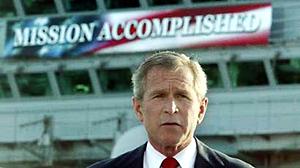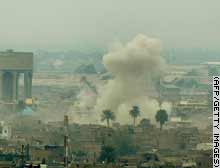
Tonight the President of the United States declared his dream of Empire defeated.
Bush Says He Takes Responsibility for Mistakes in Iraq
He has declared, that like the Viet Nam war, he will rely upon the Iraqization of the war, and rotate in more troops.
Bush Stresses Iraqi Role, More Troops in New War Plan
Many are not new troops but extensions of existing troops in the field and rotation of troops only recently removed from Iraq. There are no more troops to be had.
So the U.S. will rely upon its puppet government in Iraq to provide for some front line troops to be backed up by the U.S. just as it had in Viet Nam. All the talk over the last month has been about how this 'surge' will be led by the Iraqi's. And the result will be the same as the fall of Saigon.
By the end of 2007 the Americans will be rushing out of the Green Zone in Baghdad as they did in Viet-Nam.
The greatest irony is that Gerald Ford who passed away earlier this month was
 the President when Saigon fell.
the President when Saigon fell.No wonder he thought Bush's war ill advised, he remembered too well the Viet Nam debacle when his Secretary of Defense was Donald Rumsfeld.
We have gone from Mission Accomplished, to a plan for Victory to a plan for success to a 'surge' plan. This was the wrong war at the wrong time for the wrong reasons. And now the chickens come home to roost.
'Surge' Debate a Classic Test of Power of the Purse
It was 32 years ago this winter when a heavily Democratic Congress, elected in the Watergate year of 1974, ended a decade of acquiescence and said no to the Vietnam War.
By then, the bulk of U.S. forces had been withdrawn and the war was almost entirely in the hands of the Vietnamese.
But there were still many diplomats and other Americans in the city that was still known as Saigon as well as elsewhere in the country that was still known as South Vietnam. And there were still tens of thousands of Vietnamese who had risked their standing and their well-being to serve alongside the Americans.
 Beyond all these lives, the fate of that country still bore enormous implications for the prestige of the United States. The human investment that had been made there in the 1960s and 1970s, along with the inestimable consequences back in the U.S., would make Vietnam the most compelling issue of the era for tens of millions of Americans — if not for the nation as a whole.
Beyond all these lives, the fate of that country still bore enormous implications for the prestige of the United States. The human investment that had been made there in the 1960s and 1970s, along with the inestimable consequences back in the U.S., would make Vietnam the most compelling issue of the era for tens of millions of Americans — if not for the nation as a whole.
At no time in the three decades of ensuing history has an American president been in quite so similar a predicament. But that has changed in the past year. President Bush began 2006 with a plausible case to make about the emergent, plucky democracy in Iraq. Millions had defied violence to vote and a government was taking shape. But with the bombing of the Al Askari mosque in Samarra in February, the insurgency in Iraq took a more viciously sectarian turn. For the remainder ofn 2006, the situation "on the ground" continued to deteriorate, with sharp growth in the rate of casualties among U.S. troops and Iraqis alike.


A U.S. military Apache attack helicopter flies over Baghdad. Smoke rises over central Baghdad as U.S. and Iraqi troops battle insurgents.
Claiming the Prize: Bush Surge Aimed at Securing Iraqi Oil
The American "surge" will be blended into the new draconian effort announced over the weekend by Iraqi Prime Minister Nouri al-Maliki: an all-out war by the government's Shiite militia-riddled "security forces" on Sunni enclaves in Baghdad, as the Washington Post reports. American troops will "support" the "pacification effort" with what Maliki says calls "house-to-house" sweeps of Sunni areas. There is of course another phrase for this kind of operation: "ethnic cleansing."
So Bush will surge with Maliki and his ethnic cleansing for now. If the effort flames out in a disastrous crash that makes the situation worse – as it almost certainly will – Bush will simply back another horse. What he seeks in Iraq is not freedom or democracy but "stability" – a government of any shape or form that will deliver the goods. As the Independent wryly noted in its Sunday story, Dick Cheney himself revealed the true goal of the war back in 1999, in a speech he gave when he was still CEO of Halliburton. "Where is the oil going to come from" to slake the world's ever-growing thirst, asked Cheney, then answered his own question. "The Middle East, with two-thirds of the world's oil and the lowest cost, is still where the prize ultimately lies."
See:
Iraq
Find blog posts, photos, events and more off-site about:
Vietnam, Vietnamization, Iraq, Bush, US, President, War, Maliki, Baghdad, surge, troops,
No comments:
Post a Comment